The passive
I can identify and use different forms of the passive.
1. Complete the sentences with the passive form of the verbs in brackets. Use the correct tense.
(Hoàn thành câu với dạng bị động của động từ trong ngoặc. Sử dụng thì đúng.)
1 Romeo and Juliet __________ probably __________ between 1591 and 1595. (write)
2 __________ these glasses __________?’ ‘No, they haven’t.’ (wash)
3 He told me that the show __________ two days before. (cancel)
4 I’m sharing my sister’s bedroom because mine __________ at the moment. (decorate)
5 I walked into the office while a job applicant __________. (interview)
6 The exam results __________ by post next week. (send)
Cấu trúc chung của thể bị động: S + tobe + V3/ed + (by O).

1 Romeo and Juliet was probably written between 1591 and 1595.
(Romeo và Juliet có lẽ được viết trong khoảng thời gian từ 1591 đến 1595.)
2 Have these glasses been washed?’ ‘No, they haven’t.’
(Những chiếc kính này đã được rửa chưa?''Chưa.')
3 He told me that the show had been cancelled two days before.
(Anh ấy nói với tôi rằng buổi biểu diễn đã bị hủy bỏ hai ngày trước đó.)
4 I’m sharing my sister’s bedroom because mine is being decorated at the moment.
(Tôi đang ở chung phòng ngủ của chị tôi vì phòng ngủ của tôi hiện đang được trang trí.)
5 I walked into the office while a job applicant was being interviewed.
(Tôi bước vào văn phòng trong khi một người xin việc đang được phỏng vấn.)
6 The exam results will be sent by post next week.
(Kết quả thi sẽ được gửi qua đường bưu điện vào tuần tới.)

Các bài tập cùng chuyên đề
Bài 1 :
In the United States, fossil fuels were the main sources to ________ about 60% of total electricity generation in 2020.
-
A.
produce
-
B.
product
-
C.
producing
-
D.
be produced
Bài 2 :
Reducing the amount of carbon dioxide in the atmosphere mainly aims to _________ global climate change.
-
A.
preventable
-
B.
preventing
-
C.
prevent
-
D.
prevention
Bài 3 :
Dams and reservoirs are required _________ to store water during periods of surplus water availability.
-
A.
to be constructed
-
B.
construct
-
C.
to reconstruct
-
D.
being constructed
Bài 4 :
3 Match the highlighted passive forms in the article with 1-9 below. Then find two examples of 9.
(Nối các dạng bị động được đánh dấu trong bài viết với 1-9 bên dưới. Sau đó tìm hai ví dụ về 9.)
1 present simple passive
2 present continuous passive
3 past simple passive
4 past continuous passive
5 present perfect passive
6 past perfect passive
7 will + passive
8 modal verb + passive
9 by + agent
Bài 5 :
LEARN THIS! The passive
a We form the passive with the verb be and the past participle of the verb.
b We use a passive infinitive after modal verbs.
c We use the passive when we want to focus on the action itself, or when we do not know who or what performed the action.
(LEARN THIS! Bị động
a Chúng ta tạo thành thể bị động với động từ be và quá khứ phân từ của động từ.
b Chúng ta dùng động từ nguyên thể bị động sau động từ khiếm khuyết.
c Chúng ta dùng thể bị động khi muốn tập trung vào chính hành động đó, hoặc khi chúng ta không biết ai hoặc cái gì đã thực hiện hành động đó.)
4 Read the LEARN THIS! box. Make the active sentences passive. Use by where necessary.
(Đọc khung LEARN THIS! Biến câu chủ động thành câu bị động. Sử dụng ‘by’ những chỗ cần thiết.)
1 William Shakespeare wrote Macbeth.
(William Shakespeare đã viết Macbeth.)
Macbeth was written by William Shakespeare.
(Macbeth được viết bởi William Shakespeare.)
2 They are performing a ballet at the concert hall this evening.
3 Does Lady Gaga design the costumes?
4 How many Hobbit films have they made?
5 The artist ought to sign the painting.
6 Thousands of people will visit the gallery this year.
Bài 6 :
5 Complete the text with the verbs in brackets. Use active or passive verbs, as appropriate.
(Hoàn thành văn bản với các động từ trong ngoặc. Sử dụng động từ chủ động hoặc bị động, nếu thích hợp.)
John Myatt is a British artist. He makes copies of famous works of art, but they
1_________ (not sell) as originals. They 2_________ (paint) with ordinary decorator's paint, and the word 'fake' 3_________
(write) on the back. But it wasn't always like that. In the 1990s, Myatt 4_________ (forge) about 200 paintings. In 1998, he 5_________ (catch) and 6_________ (send) to prison for a year. Since his release from jail, Myatt 7_________ (be) very successful, and his paintings 8_________ (buy) by wealthy people all over the world. He 9_________ (be) now a rich man!
Bài 7 :
6 SPEAKING Work in pairs. Use the passive form of the verbs below to ask and answer five questions about famous works of art.
(Làm việc theo cặp. Sử dụng dạng bị động của các động từ dưới đây để hỏi và trả lời 5 câu hỏi về các tác phẩm nghệ thuật nổi tiếng.)

A: Who was E.T. directed by?
B: E.T. was directed by Steven Spielberg.
(A: E.T được đạo diễn bởi ai?
B: E.T được đạo diễn bởi Steven Spielberg.)
Bài 8 :
RECYCLE! The passive
1 We form the passive with the verb be and the past participle of the verb.
This cruise ship was built ten years ago by Hyundai.
2 We use a passive infinitive after certain verbs. We use a passive base form (infinitive without to) after modal verbs.
The passengers needed to be rescued by the emergency services.
All passports must be shown at the departure gate.
3 When we want to say who or what performed the action in a passive sentence, we use by.
(RECYCLE! Bị động
1 Chúng ta tạo thành thể bị động với động từ be và quá khứ phân từ của động từ.
Chiếc du thuyền này được đóng cách đây 10 năm bởi Hyundai.
2. Chúng ta sử dụng động từ nguyên thể bị động sau một số động từ. Chúng ta sử dụng thể bị động (nguyên thể không có to) sau các động từ khuyết thiếu.
Các hành khách cần được giải cứu bởi các dịch vụ khẩn cấp.
Tất cả hộ chiếu phải được xuất trình tại cổng khởi hành.
3 Khi chúng ta muốn nói ai hoặc cái gì đã thực hiện hành động trong câu bị động, chúng ta dùng by.)
6 Read the Recycle! box. Complete the questions using the passive and the verb in the brackets.
(Đọc khung Recycle! Hoàn thành các câu hỏi sử dụng bị động và động từ trong ngoặc.)
1 Where __________ Wat Arun __________? (locate)
2 Why __________ Wat Arun __________the 'Temple of Dawn'? (call)
3 What __________ in bread to make difference to banh mi? (can/fill)
4 Why __________ vegetables __________ to banh mi? (add)
5 When __________ the buses __________with passengers? (pack)
6 Which opportunities __________ to the man's family? (can/offer)
Bài 9 :
7.1 The passive
(Bị động)
We form the passive with the verb be + the past participle.
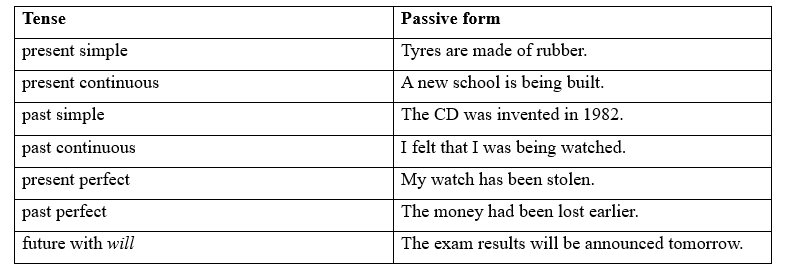
In passive constructions, we use by when we want to say who (or what) performed the action.
The TV was invented by John Logie Baird.
After modal verbs, we use a passive infinitive.
Homework must be handed in on time.
We're winning 2-0 with only a minute to go. We can't be beaten now.
Tạm dịch
Chúng ta tạo thành thể bị động với động từ be + quá khứ phân từ.
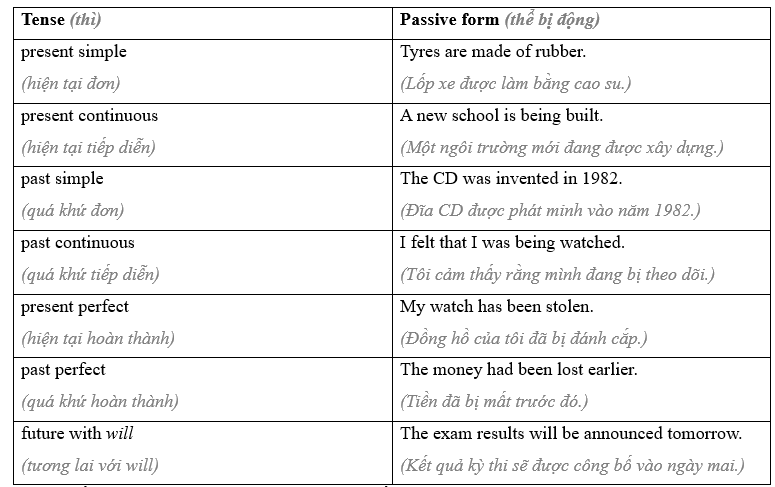
Trong cấu trúc bị động, chúng ta dùng by khi muốn nói ai (hoặc cái gì) đã thực hiện hành động.
TV được phát minh bởi John Logie Baird.
Sau các động từ khiếm khuyết, chúng ta sử dụng một nguyên mẫu bị động.
Bài tập về nhà phải được nộp đúng hạn.
Chúng ta đang thắng 2-0 khi chỉ còn một phút nữa. Chúng ta không thể bị đánh bại bây giờ.
1 Complete the passive sentences with the correct form of the verb be. One sentence has more than one correct answer.
(Hoàn thành các câu bị động với dạng đúng của động từ be. Một câu có nhiều hơn một câu trả lời đúng.)
1 Your homework __________ returned to you tomorrow afternoon.
2 As I was walking home last night, I thought that I __________ followed.
3 The road into town __________ closed for three days last week.
4 'Where __________ parmesan cheese made?' 'In Italy.'
5 Right now the match __________ watched by millions of people round the world.
6 My dress __________ cleaned, so I can wear it tonight.
7 I rang the station, and they told me that the train __________ cancelled.
Bài 10 :
2 Complete the sentences with the passive form of the verbs below. Use an appropriate tense.
(Hoàn thành các câu với dạng bị động của các động từ dưới đây. Sử dụng một thì thích hợp.)

1 Six paintings _______________ from the museum last night.
2 We had to have our choir rehearsal outside yesterday because the school hall _______________ for a meeting.
3 This play _______________ only _______________ two or three times in the last fifty years.
4 By the time they put the fire out, most of the opera house _______________
5 Millions of photos _______________ to social networking sites every day.
6 When the new art gallery opens next year, the old art gallery _______________ to property developers.
7 They're halfway through making the film.
It _______________in the Middle East.
Bài 11 :
3 Complete the sentences with a modal verb followed by a passive infinitive. Use the words in brackets.
(Hoàn thành các câu với động từ khuyết thiếu theo sau là động từ nguyên thể bị động. Sử dụng các từ trong ngoặc.)
1 If it rains, the match _______________________ (might / cancel)
2 During lessons, your mobile phone _______________________ in your bag. (must / leave)
3 Meat _______________________ right through. (should / cook)
4 Books _______________________ out of the library. (must not / take)
5 School uniforms _______________________ on the school trip. (needn't / wear)
Bài 12 :
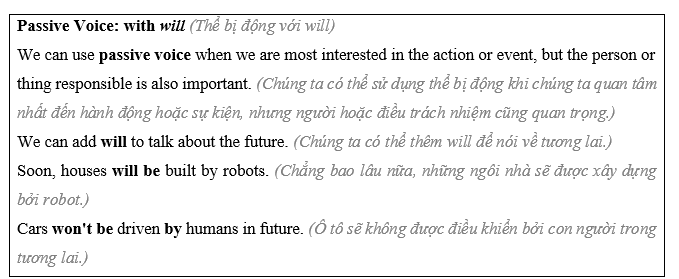
a. Look at the picture. What do you think the people are saying?
(Nhìn vào bức tranh. Bạn nghĩ mọi người đang nói gì?)

Bài 13 :
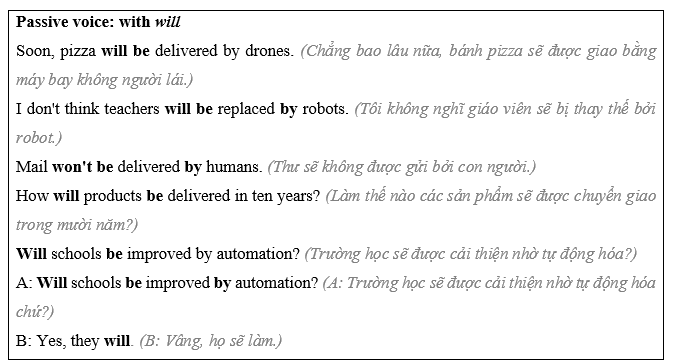
a. Fill in the blanks using Passive Voice with will.
(Điền vào chỗ trống bằng cách sử dụng Thể bị động với will.)
1. In a few years, meals in restaurants (cook) will be cooked by robots.
2. I think that many jobs (do) ____________ by machines.
3. In smart homes, waste (recycle) ______________ automatically.
4. How ____________ drones (control) _______________ in the future?
5. _______________ delivery services (automate) ______________soon?
6. Most vehicles (not drive) _____________ by humans.
Bài 14 :
b. Write passive sentences about cities in the future using the information in the table.
(Viết câu bị động về các thành phố trong tương lai bằng cách sử dụng thông tin trong bảng.)
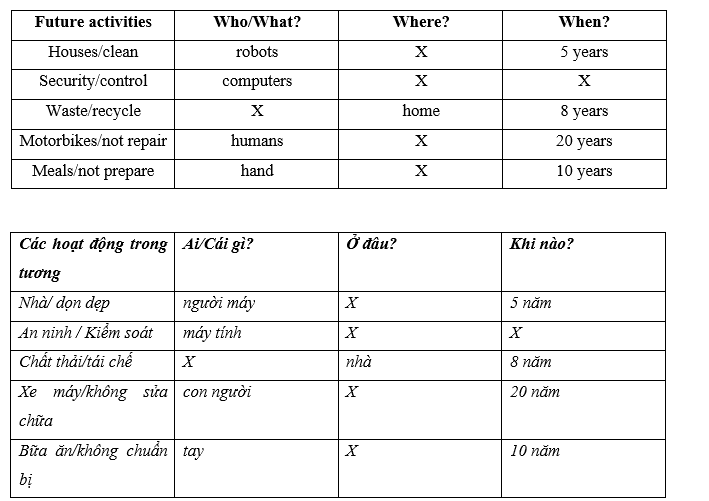
1. Houses will be cleaned by robots in five years.
2. ________________________________________
3. ________________________________________
4. ________________________________________
5. ________________________________________
Bài 15 :
c. In pairs: Take turns using Passive Voice with will to make predictions about how your home or school will be different in the future.
(Theo cặp: Thay phiên nhau sử dụng Giọng nói bị động với will để đưa ra dự đoán về ngôi nhà hoặc trường học của bạn sẽ thay đổi như thế nào trong tương lai.)
How do you think our homes will be different in the future?
(Bạn nghĩ ngôi nhà của chúng ta sẽ khác như thế nào trong tương lai?)
I think that our rooms will be cleaned by robots in about ten years.
(Tôi nghĩ rằng các phòng của chúng tôi sẽ được dọn dẹp bởi robot trong khoảng mười năm nữa.)
Bài 16 :
Grammar
The passive (Thể bị động)
6. Complete the sentences in the passive.
(Hoàn thành các câu ở thể bị động.)
1. They invented the telephone for communication.
(Họ đã phát minh ra điện thoại để giao tiếp.)
=> The telephone was invented for communication.
(Điện thoại được phát minh để giao tiếp.)
2. Mike is repairing the electric car at the moment.
(Mike đang sửa xe điện vào lúc này.)
=> The electric car ___________________ by Mike at the moment.
3. They record the online course every day.
(Họ ghi lại khóa học trực tuyến mỗi ngày.)
=> The online course ___________________ every day.
4. The students have finished the online test.
(Học sinh đã hoàn thành bài kiểm tra trực tuyến.)
=> The online test ___________________ by the students.
5. Joe was installing the CCTV security camera at noon yesterday.
(Joe đang lắp đặt camera an ninh CCTV vào trưa hôm qua.)
=> The CCTC security camera ___________________ at noon yesterday.
6. Serena will take a guided tour of the city.
(Serena sẽ tham gia một chuyến tham quan thành phố có hướng dẫn viên.)
=> A guided tour of the city ___________________ by Serena.
7. Ben couldn’t download the app.
(Ben không thể tải xuống ứng dụng.)
=> The app ___________________ by Ben.
8. When did Alexander Graham Bell invent the telephone?
(Alexander Graham Bell phát minh ra điện thoại khi nào?)
=> When ___________________ by Alexander Graham Bell?
Bài 17 :
7. Choose the correct option.
(Chọn phương án đúng.)
1. The sightseeing tour was organised with/by a famous travel company.
2. All the documents are stored by/with students on the cloud library.
3. The aeroplane was made by/with special light aluminum.
4. The electronic game was created by/with a special new software.
5. The robot was built with/by small plastic parts.
6. Distance learning was set up by/with the university.
Bài 18 :
3. Read the GRAMMAR FOCUS and complete the examples with the passive forms in blue in the text. Add examples of other tenses.
(Đọc NGỮ PHÁP TRỌNG ÂM và hoàn thành các ví dụ với các dạng bị động được tô màu xanh lam trong văn bản. Thêm ví dụ về các thì khác.)
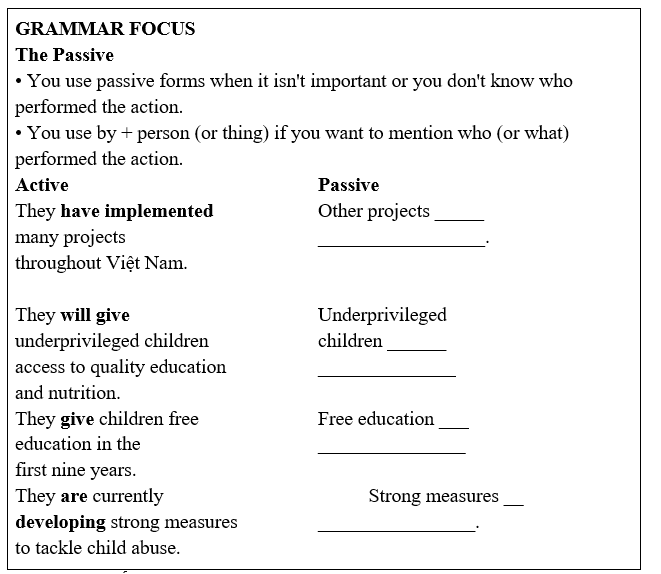
Bài 19 :
4. Complete the sentences with the correct passive form of the verbs in brackets.
(Hoàn thành các câu với dạng bị động đúng của động từ trong ngoặc.)
1. His kindness _____ (appreciate) by all the people around him.
2. In recent years, body-shaming _____ (regard) an alarming issue on social media in Việt Nam.
3. Minh’s brave moves _____ (capture) on camera on the day he helped the little girl.
4. Many lives _____ (save) thanks to your generous acts in the future.
5. A large number of underprivileged children _____ (impact) by the flood at the moment.
Bài 20 :
2. Complete the second sentence so that it has a similar meaning to the first using the passive.
(Hoàn thành câu thứ hai để nó có nghĩa tương tự như câu đầu tiên bằng cách sử dụng bị động.)
1. ChildFund will support poor children to have access to quality education. Poor children ______
2. You need an anti-virus software to protect your computer.
An anti-virus software ______
3. She offered a small reward for the good deed that I had done.
A small reward ______
4. Students will boost their self-confidence when they participate in community activities.
Students' self-confidence ______
5. Up to now, our teacher has given generous compliments for our project.
Up to now, generous compliments ______
Bài 21 :
Grammar
The passive
(Bị động)
4. Rewrite the sentences in the passive voice.
(Viết lại các câu ở thể bị động.)
1 The student couldn't update the tablet.
____________________________________
2 They don't record music at this studio.
____________________________________
3 The man in the electronics shop repairs my phone.
____________________________________
4 They set up the World Wide Web in the late 20th century.
____________________________________
5 The teacher will download the educational app.
____________________________________
6 The students have built the radio with spare parts.
____________________________________
Bài 22 :
Mark the letter A, B, C, or D to indicate the sentence that is closest in meaning to each of the following questions.
Hundreds of students in Can Tho crafted 800 paper lanterns for poor children in the last Mid-Autumn Festival.
-
A.
Both the students and poor children in Can Tho crafted 800 paper lanterns in the last Mid-Autumn Festival.
-
B.
800 paper lanterns were crafted for poor children in the last Mid-Autumn Festival by hundreds of students in Can Tho.
-
C.
Hundreds of students in Can Tho had 800 paper lanterns made for poor children in the last Mid-Autumn Festival.
-
D.
Thanks to hundreds of students in Can Tho, poor children made 800 paper lanterns in the last Mid-Autumn Festival.
Bài 23 :
2. Complete the text with the passive form of the verbs in brackets. Use the correct tense.
(Hoàn thành đoạn văn với dạng bị động của động từ trong ngoặc. Sử dụng thì đúng.)
Until 2004, composer Mamoru Samuragochi 1_________ (know) as ‘Japan’s Beethoven’. He is most famous for his Hiroshima Symphony No. 1, which 2_________ (compose) in 2003 in memory of the people who 3_________ (kill) by the atomic bomb in 1945. It 4_________ (perform) for the first time in 2008 in front of many of the world’s most important politicians. But Samuragochi now admits that this piece and many others 5_________ in fact _________ (not write) by him, but by another musician. The real composer of the musician’s works 6_________ yet _________ (not name), but a man called Takahashi Niigaki recently claimed to have written them. Although a talented composer, it is sad that in the future Samuragochi 7_________ (remember) as a fraud.
Bài 24 :
3. Write passive sentences with by.
(Viết câu bị động với by.)
1 Leonardo da Vinci painted the Mona Lisa.
__________________________________
2 A group of young men will perform the dance.
__________________________________
3 The Queen has opened a new art gallery.
__________________________________
4 JJ Abrams directed Star Wars: The Force Awakens.
__________________________________
5 In The Theory of Everything, Eddie Redmayne plays the role of Stephen Hawking.
__________________________________
Bài 25 :
4. Make the active sentences passive. Use modal verbs. Don’t use by + agent.
(Làm cho câu chủ động bị động. Sử dụng động từ khiếm khuyết. Không sử dụng by + tác nhân.)
1 You shouldn’t eat those mushrooms.
(Bạn không nên ăn những loại nấm đó.)
Those mushrooms shouldn’t be eaten.
(Những loại nấm đó không nên được ăn.)
2 They might have cancelled the concert.
_________________________________
3 You can often see foxes in my garden.
_________________________________
4 We mustn’t use mobiles during lessons.
_________________________________
5 You have to write your name in capital letters.
_________________________________
6 You can’t trust Toby!
_________________________________
Bài 26 :
5. Some of the sentences are incorrect. Rewrite them correctly. Tick the correct sentences.
(Một số câu sai. Viết lại chúng một cách chính xác. Đánh dấu vào câu đúng.)
1 I think we are been followed. ☐
_________________________________
2 Peugeot cars make in France. ☐
_________________________________
3 Set Fire to the Rain was written and performed by Adele. ☐
_________________________________
4 The book must be returning to the library. ☐
_________________________________
5 Was German teaching in your school? ☐
_________________________________
6 Oh no! My mobile has been stolen! ☐
_________________________________
Bài 27 :
have something done
I can use the structure “have something done”.
1. Order the words to make sentences with have something done
(Sắp xếp các từ để tạo thành câu với have something done)
1 You look different. (had / you / your / dyed / hair / have)?
_____________________________________
2 There’s room for you all to stay at our house this year. (extension / we’ve / built / an / had).
_____________________________________
3 I can’t text you. (phone / had / I’ve / stolen / my).
_____________________________________
4 He’s started wearing glasses. (tested / eyes / had / his / he’s).
_____________________________________
5 I couldn’t open my parents’ front door. (locks / they / had / the / changed)!
_____________________________________
6 This is a great photo. (can / copy / have / made / we / a)?
_____________________________________
Bài 28 :
a. Fill in the blanks with phrases from the box.
(Điền các từ trong khung vào chỗ trống.)

1. Next year, the WizePhone 10 _____ with new features like a 3D screen.
2. In ten years, people won’t go to the supermarket. Their food _____ to their homes by a drone.
3. People are worried that their jobs _____ and done by a robot or a computer in 20 years.
4. If you live in a modern city, the mail probably _____ by a human after 2030 because a robot will do it.
5. Do you think that one day taxis _____ by automated drones?
6. I don’t think that homework _____ using pens or pencils for much longer.
Bài 29 :
b. Unscramble the sentences.
(Sắp xếp lại câu.)
1. future./ the/ delivered/ in/ be/ Packages/ by/ will/ drones
2. In/ be/ years,/ automated./ five/ factory/ most/ jobs/ might
3. year./ transportation/ improved/ next/ be/ Our/ will/ public
4. by/ robots/ Will/ be/ replaced/ the/ waiters/ in/ future?
5. hundred/ by/ Will/ a/ built/ be/ hand/ years?/ houses/ in
Bài 30 :
The passive
(Bị động)
6. Complete the sentences using the passive voice.
(Hoàn thành các câu bằng cách sử dụng thể bị động.)
1 A thief stole Matt's wallet while he was on holiday.
Matt's wallet ____________ by a thief while he was on holiday.
2 Experienced professors are teaching the online course.
The online course ____________ by experienced professors.
3 The student has downloaded an educational app on his computer.
An educational app ____________ by the student on his computer.
4 Schools will use augmented reality in the future.
Augmented reality ____________ by schools in the future.
5 Tom was writing an online test yesterday morning.
An online test ____________ by Tom yesterday morning.


















Danh sách bình luận